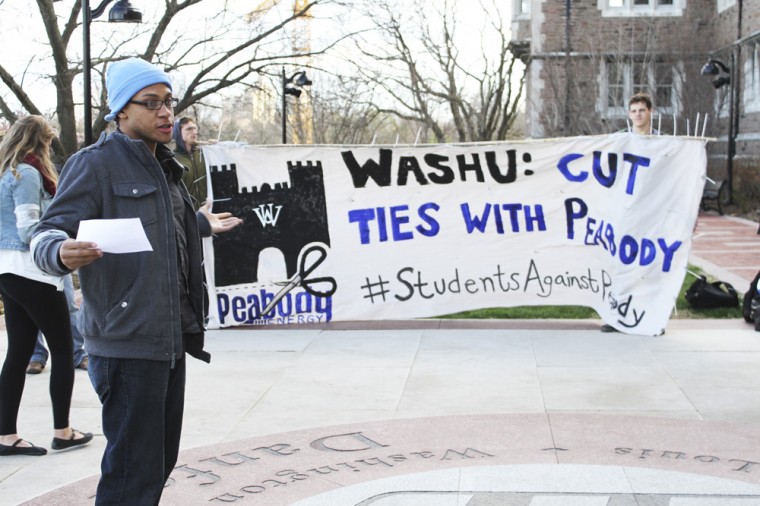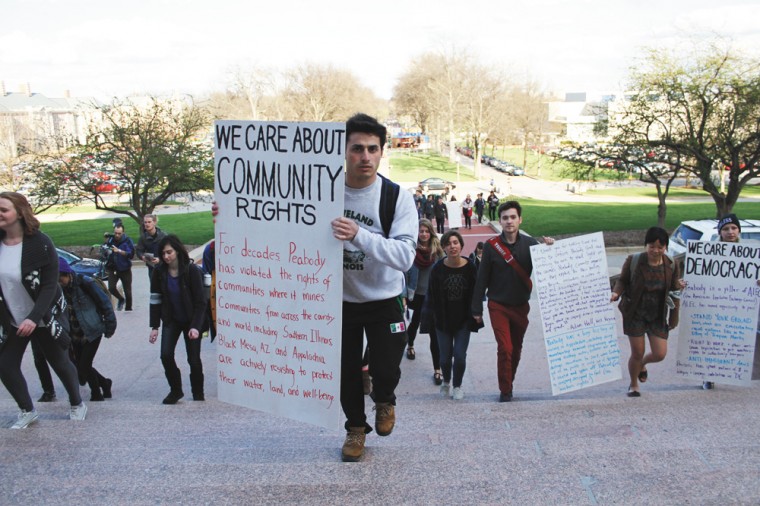News
Students of Fossil Free WashU aim for divestment with letter to chancellor
As part of Global Divestment Day, Fossil Free WashU sent a letter to Chancellor Mark Wrighton on Feb. 13 encouraging him to divest Washington University’s endowment from fossil fuel companies.

A student informs other rally attendees about Peabody Energy’s Rocky Branch mine using local lands to expand its facilities in Illinois. Students staged a sit-in for more than two weeks last April to protest the University’s involvement with Peabody.
Fossil Free WashU (FFWU), an organization that aims to have Washington University divest its endowment from fossil fuel companies, is currently using Facebook to spread its open letter amongst the student population. The group wants the University to freeze the amount invested right now and eventually remove any money from the top 200 fossil fuel companies.
In 2013, a survey collected data revealing that out of 1,000 students, only 6 percent would be against divestment, and in the same year, a petition for divestment gained 700 signatures. Additionally, in 2014, Student Union passed a resolution that supported divestment and outlined the processes by which the University could do so.
The group’s letter cited a study by the Aperio Investment group, which claimed that the differences in portfolios that are and aren’t still invested in fossil fuels is extremely minimal, and the risk resulting from divestment is about a 0.005-percent increase. The University does not make the investment of its endowment public, but according to projections from FFWU based on comparable data from similar institutions, 3 to 5 percent of the endowment is invested in fossil fuel companies.
“It has become clear to us as students that we cannot stand idly by while our educational institution supports companies that degrade the environment, abuse human rights, and worsen public health through its investments,” FFWU wrote in its letter to Wrighton.

Students march up Brookings Steps last April to initiate a sit-in encouraging Washington University to cut ties with Peabody Energy. The series of protest events concluded with the arrests of seven students trying to deliver a letter encouraging Peabody CEO Greg Boyce to resign from the University’s board of trustees.
The letter continues, “Wash U and other universities have a unique opportunity to stand up as responsible world leaders and motivate large-scale action for a sustainable future. This issue is only going to grow in importance.”
President of FFWU and sophomore Chloe Ames wants Wrighton and the University to consider the school’s scholarly basis in making this decision.
“By divesting in fossil fuels, that shows that not only does Wash. U. support the scientific facts that have been found and the research on fossil fuels that they have been very negative toward the environment and the greater world,” Ames said. “That’s definitely a step forward for the University, improving its dedication to both its students, people and just science in general as a research community.”
According to sophomore Nate Thomas, FFWU’s treasurer, divestment would not affect the amount of money received by major donors such as Peabody Energy and Arch Coal.
“If they were to stop donating and take away their support for the school, they would also lose a lot because they get a lot of this relationship, too,” Thomas said. “That’s not something they would likely jeopardize. Even if the University took its relatively small amount of investments in fossil fuels out, it’s pretty unlikely they might be offended, might be unhappy, but the thought of them pulling out their support for our school is not really on the table.”
Although the letter has not been acknowledged publicly by the chancellor, FFWU hopes that the University considers the benefits of divesting.
“We think divestment in fossil fuels is very important for combating climate change, and what we really think that Wash. U. could do by divesting is take a stand,” Thomas said. “It would really send a strong message, and that’s the main benefit of it and that’s what we would like to see. We would like obviously all fossil fuels to be divested.”
Freshman Keaton Schifer, however, does not believe the University should have to listen to the requests of FFWU.
“My general opinion is that [Washington University] is a private institution; they can really invest in whatever company they see fit that would benefit them and their interests,” Schifer said. “And if that is a fossil fuels company, then that would be the right choice for them.”
Schifer added, “I’ve never had a problem before in supporting the oil and coal industry, so I do not have an issue with it.”
Editor’s note: A photo caption in this article has been amended to correctly reflect the identity of a protester. Student Life regrets the error.
